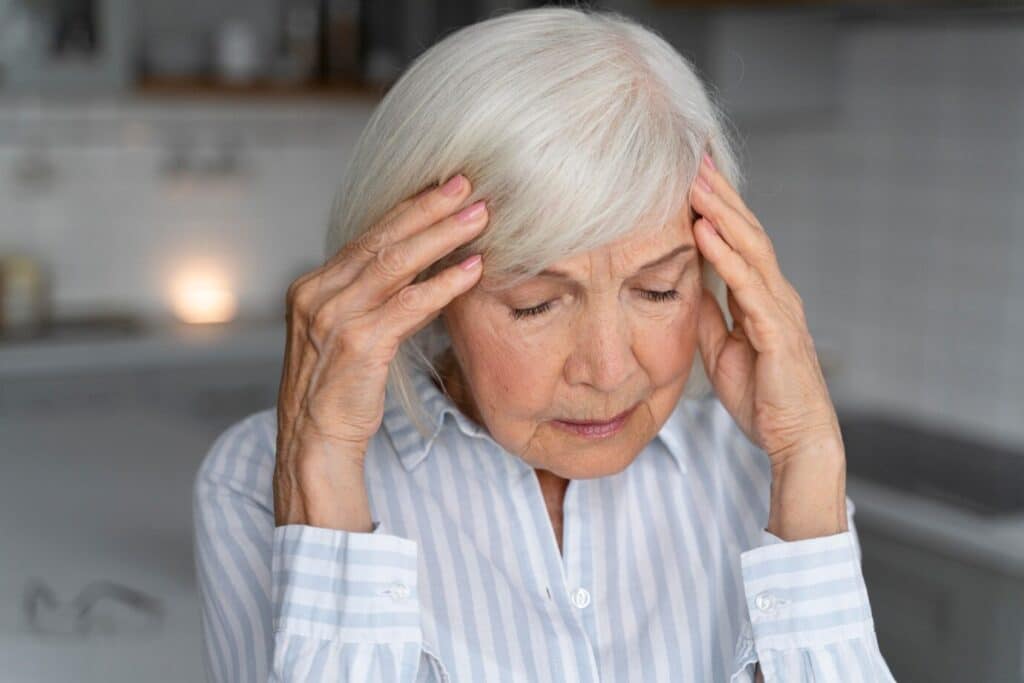Welcome to Vessel Longevity & IV Bar (ATX) in Cedar Park, TX. As we age, hormone replacement therapy (HRT) becomes a common consideration for many seniors seeking to alleviate symptoms of menopause or andropause. While HRT offers promising benefits, it’s essential to understand the potential side effects. In this comprehensive guide, we’ll delve into seven unexpected side effects of HRT, shedding light on what seniors need to know to make informed decisions about their health and wellness.
1. Mood Swings and Emotional Changes:
Hormonal fluctuations induced by HRT can unexpectedly impact mood and emotional well-being. While some individuals may experience mood swings or increased emotional sensitivity, others may notice improvements in mood and overall emotional stability. Seniors undergoing HRT must communicate openly with their healthcare provider about any changes in mood or emotional state, as adjustments to treatment may be necessary to achieve optimal balance.
- Hormonal fluctuations can lead to mood swings and emotional sensitivity.
- Open communication with healthcare providers is essential to address emotional changes effectively.
- Some individuals may experience improvements in mood with HRT treatment.
2. Weight Fluctuations:
HRT can influence metabolism and body composition, leading to weight fluctuations for some individuals. While some seniors may notice weight gain as a side effect of HRT, others may experience weight loss or changes in body fat distribution. Maintaining a balanced diet and regular exercise routine while undergoing HRT is essential to support overall health and manage weight changes effectively.
- HRT can impact metabolism and body composition, resulting in weight fluctuations.
- Seniors should maintain a balanced diet and regular exercise routine to support overall health during HRT.
- Consultation with a healthcare provider can help manage weight changes effectively while on HRT.
3. Breast Tenderness and Swelling:
For some individuals, HRT may cause breast tenderness and swelling due to hormonal changes. While these side effects are typically temporary and subside with continued treatment, they can cause discomfort and concern for seniors. Wearing a well-fitted bra and applying warm compresses can help alleviate symptoms of breast tenderness. However, it’s essential to consult with a healthcare provider if symptoms persist or worsen.
- Hormonal changes induced by HRT can lead to breast tenderness and swelling.
- Wearing a well-fitted bra and applying warm compresses can provide relief from symptoms.
- Seniors should consult with their healthcare provider if breast tenderness persists or worsens during HRT treatment.
4. Headaches and Migraines:
Some seniors may experience headaches or migraines as a side effect of HRT. Hormonal fluctuations can trigger these symptoms in susceptible individuals. However, they often improve over time as the body adjusts to the treatment. Maintaining hydration, practicing stress-reduction techniques, and ensuring adequate sleep can help alleviate headaches and migraines associated with HRT.
- Hormonal fluctuations induced by HRT can trigger headaches and migraines in some seniors.
- Hydration, stress reduction, and adequate sleep can help alleviate symptoms of headaches and migraines.
- Persistent or severe headaches should be discussed with a healthcare provider to determine appropriate management strategies.

Headaches and Migraines
5. Changes in Libido:
HRT can affect libido and sexual function in seniors, leading to changes in desire, arousal, and satisfaction. While some individuals may experience an increase in libido with hormone replacement therapy, others may notice a decrease or fluctuations in sexual interest. Open communication with a healthcare provider and exploring alternative treatments or adjustments to HRT dosage can help address changes in libido effectively.
- HRT can influence libido and sexual function, leading to changes in desire and satisfaction.
- Open communication with a healthcare provider is essential to address changes in libido during HRT.
- Exploring alternative treatments or dosage adjustments can help manage fluctuations in sexual interest effectively.
6. Digestive Issues:
Digestive issues such as bloating, gas, or nausea may occur as a side effect of HRT in some seniors. Hormonal fluctuations can impact gastrointestinal function, leading to discomfort and disruption in digestion. Consuming smaller, more frequent meals, avoiding trigger foods, and incorporating fiber-rich foods into the diet can help alleviate digestive issues associated with hormone replacement therapy.
- HRT may cause digestive issues such as bloating, gas, or nausea due to hormonal fluctuations.
- Dietary modifications, such as consuming smaller meals and avoiding trigger foods, can help alleviate digestive discomfort during HRT.
- Seniors experiencing persistent digestive issues should consult their healthcare provider for personalized recommendations.
7. Skin Changes:
HRT can influence skin health and appearance, increasing hydration, acne, or skin sensitivity. While some seniors may notice skin elasticity and texture improvements with hormone replacement therapy, others may experience acne breakouts or increased oiliness. Following a consistent skincare routine and using gentle, non-comedogenic products can help manage skin changes effectively during HRT.
- Hormonal fluctuations induced by HRT can impact skin health and appearance.
- Following a consistent skincare routine with gentle products is essential to manage skin changes during hormone replacement therapy.
- Seniors experiencing significant skin issues should consult a dermatologist or healthcare provider for personalized skincare recommendations.
FAQs:
- Is hormone replacement therapy suitable for all seniors?
- HRT may not be appropriate for everyone, especially those with a history of certain medical conditions, such as breast cancer or cardiovascular disease. Seniors need to undergo thorough evaluation and consultation with a healthcare provider before starting hormone replacement therapy.
- Are there alternative treatments for managing menopausal symptoms besides HRT?
- Yes, several alternative treatments and lifestyle modifications can help alleviate menopausal symptoms, including dietary changes, regular exercise, herbal supplements, and stress reduction techniques. Seniors should discuss these options with their healthcare provider to determine the most suitable approach for their needs.
- How long does it take to experience the benefits of hormone replacement therapy?
- The timeframe for experiencing the benefits of HRT can vary depending on individual factors such as hormone levels, dosage, and treatment duration. Some seniors may notice improvements in symptoms within a few weeks, while others may require several months for optimal results. Patience and regular communication with a healthcare provider are essential during the HRT process.
Takeaways:
- Hormone replacement therapy (HRT) can offer relief from menopausal or andropause symptoms, but it may also entail unexpected side effects.
- Open communication with a healthcare provider is crucial for effectively managing and addressing HRT side effects.
- Seniors should maintain a healthy lifestyle and consult with their healthcare provider regularly while undergoing hormone replacement therapy.
At Vessel Longevity & IV Bar (ATX), we’re dedicated to supporting seniors in their journey toward optimal health and wellness. If you have any questions or concerns about hormone replacement therapy or would like personalized guidance, please don’t hesitate to contact us at 512-337-7722. Our experienced team is here to help you navigate your wellness journey with confidence and care.

